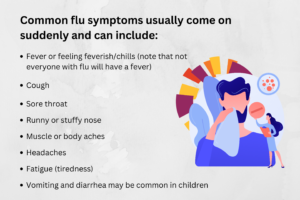Influenza (Flu)
What is Influenza?
Influenza, also known as the flu, is a very contagious respiratory illness that is spread from person to person through sneezes and coughs. It can particularly affect the nose, throat, and lungs.
Reduce the risk of becoming sick with the flu—and its potentially serious complications—by getting vaccinated each year.
Call 707-303-3600 to schedule your flu vaccine today!
The flu can be serious for anyone, but those most at risk for serious complications are:
- children under 5 (particularly those under 2)
- pregnant people
- people over 65 years of age
- people with certain chronic medical conditions (such as asthma, diabetes, or heart disease)

Learn more about flu symptoms symptoms here.
With flu and COVID circulating together, along with other respiratory diseases, it’s important to be properly diagnosed to determine the appropriate treatment. There are a number of tests available to determine if you have the flu. Your healthcare provider may test you for flu or diagnose you based on your symptoms.
It is possible to have flu and COVID-19 at the same time. Due to some symptoms of flu and COVID-19 being similar, it’s hard to tell the difference between them based on symptoms alone. A diagnostic test can help determine if you are sick with flu, COVID-19, or another respiratory infection.
Are your symptoms the flu, a cold, or COVID-19?
cold-flu-covid-19
Both COVID-19 and flu can spread from person to person, between people who are in close contact with one another (within about 6 feet). Both are spread when people with the illness (COVID-19 or flu) cough, sneeze, or talk. Knowing if you’re infected with the virus that causes COVID-19 allows you to take care of yourself and take action to reduce the chance that you will infect others. See more information on COVID-19 here.
If you get sick with the flu, be sure to (1) Take antiviral drugs, if prescribed by a health care provider, (2) Take everyday precautions to protect others while sick, and (3) Stay home until you are better.
Getting a flu vaccine is an easy step to protect yourself and your community!
The flu vaccine is very safe. Like any vaccine or medication, there can be side effects, but they are usually mild and go away in a day or two. The most common side effect is soreness in the arm where the vaccination is received.
There are many reasons to get the influenza (flu) vaccine each year. Flu vaccination is the best way to protect yourself and your loved ones against flu and its potentially serious complications.
Did you know? The Flu vaccine:
-
- can keep you from getting sick with the flu
- has been shown in several studies to reduce the severity of illness in people who get vaccinated but still get sick
- can reduce the risk of flu-associated hospitalization
- is an important preventive tool for people with certain chronic health conditions
- helps protect pregnant people during and after pregnancy
- can be lifesaving for children

How to Keep Yourself and Your Family Healthy During Flu Season
In addition to getting your flu vaccine every year and your COVID vaccines, here are some other ways you can help protect yourself and your loved ones from dangerous contagious diseases:
- If you are sick, stay away from other people as much as possible to keep from infecting them.
- Cover your cough or sneeze with a tissue, then throw the tissue in the trash. If you don’t have a tissue, sneeze or cough into your elbow.
- Avoid touching your eyes, nose, and mouth. Germs spread this way.
- Wash your hands often with soap and water for at least 20 seconds. Use hand sanitizer if soap and water are not available.
- Clean and disinfect frequently touched objects and surfaces in your home.
- Keep these items on hand when venturing outside your home: a face mask, tissues, and a hand sanitizer with at least 60% alcohol.
Children & The Flu
 “When should my child get the Influenza vaccine?” Your child (and everyone in your family) should get a flu vaccine every fall, ideally before October. It can take up to two weeks for the flu shot to offer the best protection, so get it as early as possible (but you can still get the shot and be protected anytime the vaccine is being offered.)
“When should my child get the Influenza vaccine?” Your child (and everyone in your family) should get a flu vaccine every fall, ideally before October. It can take up to two weeks for the flu shot to offer the best protection, so get it as early as possible (but you can still get the shot and be protected anytime the vaccine is being offered.)
“At what age should my child be vaccinated?” Babies older than six months can get the flu vaccine. Children younger than eight years may need two doses for the best protection. Pregnant people should receive the vaccine to help protect themselves and their newborn babies.
We are urging all Californians six months of age and older to get vaccinated against the flu now, even if they have already gotten a COVID-19 vaccine. Talk to your healthcare provider about what vaccines your family needs, and call 707-303-3600 to schedule an appointment.
It’s important to be aware of the different types of flu vaccines that your child can receive and the risks that may come with them. Click here to learn more.
Emergency warning signs for children with the flu:
If your child has any of these symptoms, get them medical care immediately.
- Fast breathing or trouble breathing
- Bluish lips or face
- Ribs pulling in with each breath
- Chest pain
- Severe muscle pain (child refuses to walk)
- Dehydration (no urine for 8 hours, dry mouth, no tears when crying)
- Not alert or interacting when awake
- Seizures
- Fever above 104°F
- Any fever in children younger than 12 weeks
- Fever or cough that improved but then returns or worsens
- Worsening of chronic medical conditions
![$logo['alt']](https://srhealth.org/wp-content/uploads/2017/03/srch-logo-1.png)